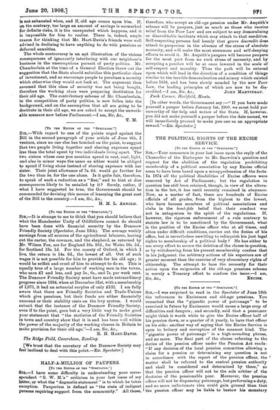THE POLITICAL RIGHTS QF THE EZcip SERVICE.
yrs THE EDITOR or THE " SPECTAT01.1 SiR,—Your comments in your last issue upon the reply of the Chancellor of the Exchequer to Mr. Snowden's question and request for the abolition of the regulation prohibiting membership of a political association by any Excise official seem to have been based upon a misapprehension of the facts. In 1874 all the political disabilities of Excise officers were removed by Act of Parliament; but the regulation in question has still been retained, though, in view of the altera- tion in the law, it has until recently remained in abeyance. Now, as a matter of fact, there are hundreds of Excise officials of all grades, from the highest to the lowest, who have become members of political associations and clubs in the bond fide belief that their conduct was not in antagonism to the spirit of the regulations. If, however, the rigorous enforcement of a rule contrary to statute law is to be sanctioned by the Government, what is the position of the Excise officer who at all times, and often under difficult conditions, carries out the duties of his office, but is nevertheless unwilling to relinquish his just legal rights to membership of a political body P He has either to use every effort to secure the deletion of the clause in question, or by withdrawing from his present membership confess that in his judgment the arbitrary actions of his superiors are of greater moment than the exercise of very elementary rights of citizenship. The attempt to base the necessity for their action upon the exigencies of the old-age pensions scheme is merely a Treasury effort to confuse the issue.—I am,










































 Previous page
Previous page